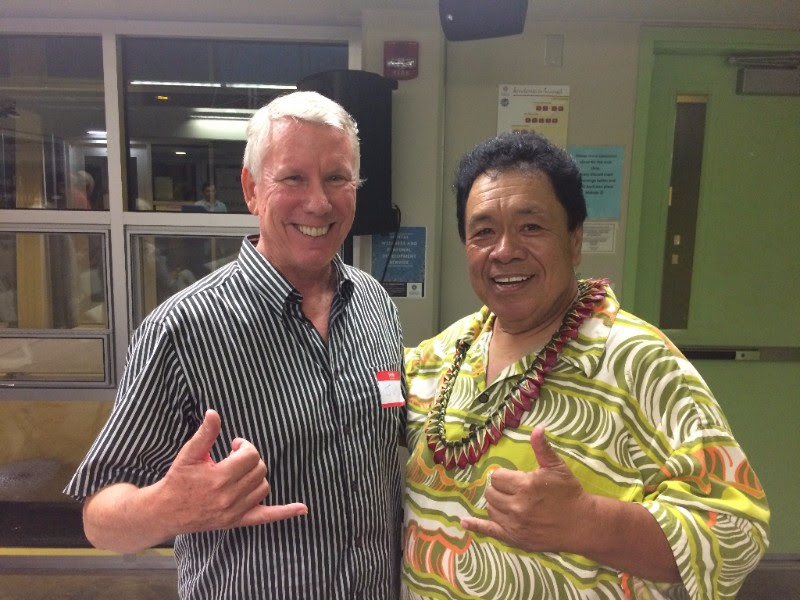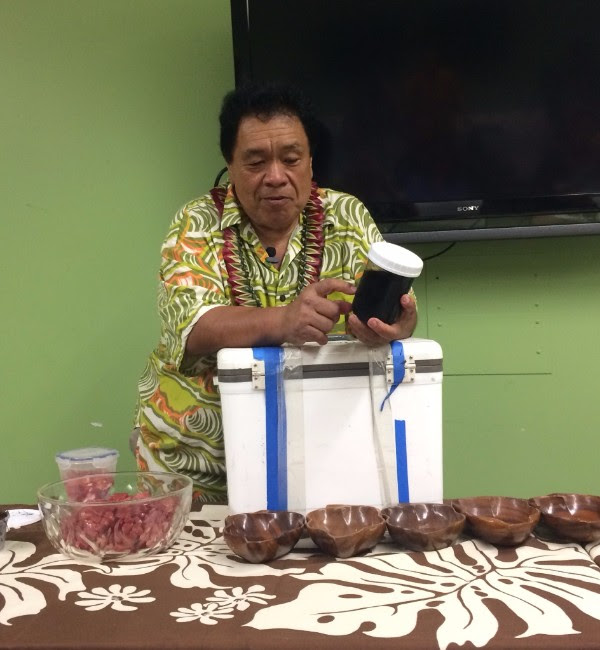HIplan Launch Highlights Benefits & Challenges of Entrepreneurship

HIplan Co-Chair Jim Wyban and Chef Sam Choy at the HIplan Kona launch event on Friday, July 21, 2017. Courtesy photo.
George Hanohano is a small-business entrepreneur—one of four who related their company histories at the launch of the 2017 Hawaii Island Business Plan (HIplan) Competition, which will award $25,000 for the best business plan, later this year (see “HIplan Competition Gets Underway” at the end of this article).
“Being your own boss is a rush!” said Hanohano, a panelist at the East Hawai‘i launch event in Hilo on Thursday, July 20, which drew 55 attendees.
Celebrity Chef Sam Choy was the featured speaker at the launch event in Kona on Friday, July 21, which drew 33 attendees.
Hanohano’s company is Rainbow Falls Connection, which employs economically disadvantaged people as bakers and marketers of baked goods.
His fellow panelists were Candace Fukuda-Hanle, who runs her family’s business, Kandi’s Drive-In restaurant; and Jesse Fujimoto who, with his wife, owns Hawaii Simple Gourmet, which grows high-value organic vegetables.

Hilo Launch Speakers (L–R): George Hanohano, Candi Fukuda-Hanle, Jesse Fujimoto and MC Derek Kurisu. HIplan photo.
The panel was chaired by Derek Kurisu of KTA Superstores, which retails some of the products from Hanohano’s and Fujimoto’s companies.
With more than 25 years in business, Choy is one of Hawai‘i’s most successful restaurateurs. For his creation of an annual festival celebrating the art of marinating and seasoning raw fish, he is locally considered the “Godfather of Poke.” And his appearance at the HIplan launch in Kona included a demonstration—and tasting—of one of his signature poke dishes.
The panelists and featured speakers shared their business experiences and offered tips to the HIplan attendees:

Chef Sam Choy at HIplan’s launch event in Kona on Friday, July 21, 2017, explains his secret sauce for his World Famous Poke. Courtesy photo.
How to Get Started
Paths to entrepreneurship are many and varied.
Hanohano was a social worker before he started the company that has since become Rainbow Connection.
He supplies baked goods to Hawai‘i wholesalers and retailers, and makes “private-label” versions for parties and other events.
The Fujimotos started by researching the market for organic produce; they concluded that it was a niche market, but one that was growing and likely to create an increased number of jobs over time.
Fukuda-Hanle’s back-story was commonplace years ago—but rare today. Her grandfather and father had owned the drive-in since she was a baby. Leaving a marketing career on the Mainland, she returned to Hilo to run the family business.
With a smile, she said: “I do have to answer to a board of directors—mom and dad!”
Choy grew up on O‘ahu’s North Shore. His family had a vegetable garden and raised chickens; but they also exposed him to a wide variety of foods and encouraged his pursuit of food as a business.
“To begin doing that,” he said, “you must have a plan and be able to change and adapt. It’s important for your plan to have a clear structure, and a strong financial team. Make sure you have written plans. Learn from your mistakes. Always challenge yourself. I love making mistakes!”
How to Launch the Company
Hanohano had to borrow money from family and friends to start his company. And his fellow panelists agreed that having an entrepreneurial business means taking financial risks.
Fukuda-Hanle was lucky: she didn’t have to find start-up money. But she faced other challenges.
“Kids like me in their 40s and 50s, who take on a family business, still have to establish themselves with co-workers. And they, like our customers, are all growing older.”
Choy’s enterprise is considerably larger than the other panelists’ businesses. His business partner, Max Height, was an engineer at Microsoft who “retired” at 37 to team up with him.
“My name is the driving force behind my business,” said Choy, “but you must have chemistry with your business partner and you have to map out how to structure a business deal; I believe that a 50-50 partnership deal is best.”
How to Keep It Going
Hanohano has been able to export some products to Japan. Nearly all of his employees are economically disadvantaged, earning not only income but valuable skills and work experience.
Fujimoto and his wife are currently focused on cultivating turmeric, a root (superficially resembling ginger) that is used both as spice and as medicine.
“We see ourselves,” he said, “as a bridge between producers and ‘conscious consumers,” adding value to the marketplace by increasing consumers’ awareness of organic produce.
For Fukuda-Hanle, the ongoing challenge at the family drive-in is to keep what has always worked, and determine what might have to change. One example: “We’ve always been known for serving breakfast and lunch; we tried adding a dinner menu, but it just didn’t draw enough customers.”
“I always watched my restaurants’ food like a hawk,” said Choy, “from the source to the setup, the prep and the serving. Don’t put up with a mediocre product.”
For a long time, he owned several restaurants with his name over the door, but nowadays, he said, “I’m selling Sam Choy franchise restaurants in cities around the world. That’s much easier than running a restaurant and worrying about quality food supply and food costs, employees and so on.”
He’s also in the process of creating a Poke Kit that’s assembled in a commissary, for sale on Amazon.
Why Work for Yourself?
“When you get your sights on something,” said Choy, “believe in it. Get people excited. Your message must be positive in business. You’ve got to have laughter!”
Jim Wyban, co-chair of the HIplan competition, is an aquaculture entrepreneur.
“I never liked being in a big organization and having bosses,” he said. “When you’re an entrepreneur, your customers are your boss—but they’re not in your face!”
His co-chair, Realtor Kelly Moran, said, “Once you start your own business, you never go back. I love going to work now!”
And self-employment, as Hanohano put it succinctly, “is a rush!”
HIplan Competition Gets Underway
Now in its second year, the HIplan competition aims, in the words of Wyban, an aquaculture entrepreneur, to “create an entrepreneurial ecosystem on Hawai‘i Island.”
Moran, noted, “When a business succeeds, there’s a multiplier effect in the form of hiring workers, encouraging suppliers and so on.”
In addition to the $25,000 that Wyban and Moran call “the big prize,” the University of Hawai‘i at Hilo and Hawai‘i Community College will each award a year’s free tuition to a student submitting the best business plan.
One of the HIplan sponsors, Pacific Media Group,* offers a separate award of $5,000 worth of free advertising to the contestant whose business plan would benefit most from an advertising campaign of that size.
Entries will be accepted until midnight Sept. 10; a semifinal round of judging will be held on Oct. 21 at the National Energy Laboratory (NELHA) in Kailua-Kona; and the winner will be named in an event to be held at NELHA on Nov. 4.
Details and requirements for entry are available online.
*BigIslandNow.com is part of Pacific Media Group.







